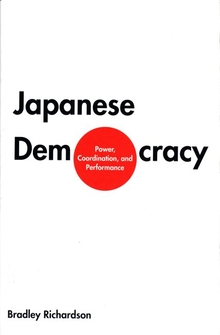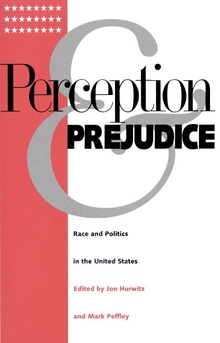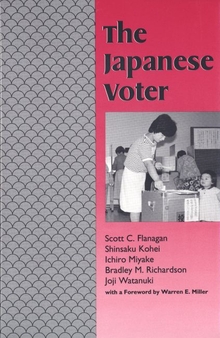Japanese Democracy
WARNING
You are viewing an older version of the Yalebooks website. Please visit out new website with more updated information and a better user experience: https://www.yalebooks.com
Power, Coordination, and Performance
Bradley M. Richardson
In Japanese Democracy, Richardson explores power relationships and demonstrates how Japan's political system is unlike Great Britain's and similar to those of the United States and Italy, where politics is decentralized and decisions are made at many levels. He draws some important conclusions: that Japan's postwar industrial policy has not always been successful, that the country is as much an economic welfare state as it is an economic "miracle," and that the lack of strong leadership has kept Japan from playing a more assertive role in the international arena. As in the United States, private interests hold central policymaking processes hostage, and weak leadership prevails.
"At a time of major transition in Japanese politics, Bradley Richardson has given us a first-rate analysis of politics and policy in Japan to help us unravel what is happening. No one knows the changing face of the Japanese electorate better than Richardson. This is an important and timely book by a top political scientist."—Professor Susan J. Pharr, Reischauer Institute for Japanese Studies, Harvard University
"Richardson's analysis of the postwar Japanese political system is a welcome addition to the literature on Japanese politics."—Choice
"[Richardson] covers his subject as broadly as a college textbook while making his arguments stick with plenty of case material from Japanese periodical literature and crosscultural comparisons. As a major interpretation of modern Japanese politics, this book is probably indispensable for political scientists and scholars of modern Japan."—David G. Egler, History
"Richardson's book is especially rich in its assessments of voting behavior, party reorganization, and legislative politics."—T. J. Pempel, American Political Science Review
"Based on published and unpublished primary and secondary sources, archival research, interviews, and discerning manipulations of theoretical models and comparative political data, Japanese Democracy convincingly challenges the "semi-authoritarian state" interpretation of postwar Japanese politics. . . . The book contains no less than forty-six tables and figures which richly enhance the author's arguments. Many provide revealing comparative data on Japan and other industrial democracies. . . . Japanese Democracy is a major contribution to our understanding of the nature and quality of democracy in postwar Japan, informed not only by the author's deep acquaintance with Japanese politics but also by his incisive theoretical and comparative observations."—David A. Titus, The Journal of Asian Studies
"Certain chapters do integrate nicely the secondary literature on legislative politics and business interests in ways that scholars and graduate students will find useful. Richardson's comparative data are also very helpful. Certain tables, moreover, such as those depicting the reconstruction of the 1998 tax reform coalition and the proposed interparty coalitions, are gems."—Richard J. Samuels, The Annals of the American Academy of Political and Social Science
"A very important book. For one thing, it is the first general interpretation of Japanese democracy to be published in quite some time. Although more than a textbook, it is the best book currently available for use as a text, particularly for graduate study in Japanese politics."—Steven R. Reed, Japan Quarterly
"Evidence that Japan is a normal nation in terms of political organization is building up, and Richardson’s book is perhaps the most convincing demonstration yet. . . . An important study."—Tim Stringer, Political Studies
Publication Date: September 10, 1998









